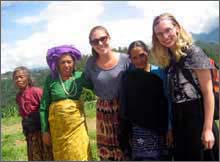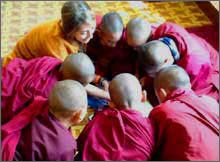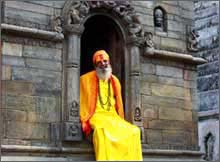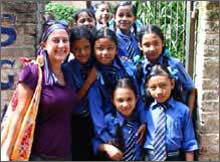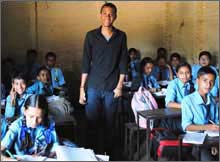Nepal
There is no country more beloved by those who have visited than Nepal. Its warm and friendly people, a rich cultural heritage, and scenic beauty defy the imagination. Nepal is one of the few places where Hindus and Buddhists live together in harmony. This country has long been a popular destination for explorers and nature lovers. At any given moment Kathmandu is overflowing with visitors from all corners of the globe.
The hot terai of the north Indian plains gives way to the foothills, then rise dramatically skyward to the icy Himalayan peaks, topping off at Mt. Everest - the highest point on earth at 8850m. Visitors revel in experiencing some of the most incredible trekking in the world, white water rafting, visiting game parks and nature preserves, or simply spending the day leisurely floating on the peaceful waters of Phewa Tal in Pokhara.
In spite of these natural blessings, Nepal is one of the poorest countries ELI works in. With a per capita income of approx $490 per year, most Nepalese live well below the poverty line. Different efforts have been made through governmental organizations to improve the deteriorating situation, but the villages of Nepal show very few effects of relief and development efforts.
Volunteer and Internship Programs
-
Women's Programs
Women's Program/Human Rights
"I wanted to find out if I could see myself doing international aid work. And now I think I can. [In college] I’m also studying poverty issues, and it was fascinating to see principles that we talk about in class and see how they play out in real life. In class they seem very straightforward: you do X, Y and Z and fix everything. And then you go to a place like Nepal and see things are a lot more complicated than that..." -Zack, Volunteer
Among the thousands of individuals who are trafficked across Nepal’s borders every year, the majority are women and children. It is estimated that Nepali women aged 15-30 make up 2.8% of the women in Indian brothels, and the numbers are sharply rising. ELI partners with grassroots organizations that work tirelessly for the promotion of gender justice, non-discriminatory and rights-based behaviors and practices.
These placements are open to participants holding a BA in a relevant field or those with significant NGO experience who are motivated and do not require a lot of supervision. Participants in this program often assist with research, reports, and projects as needed. Volunteers and interns must be able to commit to at least 6-8 weeks, and bring a laptop for research and field work. Questions? Click here
ELIer Jackson chats about his human rights internship and shares photos:
Apply Now
After you fill out the Application Form on our website, our Application Advisor will be in touch to help you with the next steps.
-
Medical & Dental
Medical & Dental
Medical
It is estimated that hundreds of thousands of Nepali people, especially women and children, suffer unnecessarily due to a lack of basic medical care. Interning at a hospital in Nepal provides participants an opportunity to learn about healthcare in a developing country and about tropical diseases. Pre-meds with relevant completed coursework, nursing students, medical students, and medical professionals are welcome to apply. This placement is ideal for motivated students who wish to learn about medical care in a developing Asian country. Students are sometimes invited to observe surgeries. This program fills up during the summer, so we recommend applying early for May, June and July arrival dates. Questions? Click here
Dental
ELI has partnered with a prominent dental school and dental hospital in the heart of Kathmandu, offering ELI interns a one-of-a-kind opportunity to learn alongside Nepali dental students. These positions are open to dental students and junior/senior level undergraduates who have some related experience/education and plan to pursue a career in the field. From time to time interns are also invited to assist with free dental camps for the poor. Questions? Click here
Medical and dental interns are requested to bring a lab coat with them to Nepal, or have one tailored for them in Kathmandu ($10-$15USD). No scrubs.
"I met some amazing people while in Nepal and got to see a lot of things I would not have seen otherwise. I would definitely recommend that if a person were going to volunteer in Nepal to try to stay at least 4 weeks in the country. I could not because of a previous commitment, but I would have otherwise! ...Had I stayed longer, I think I would have considered doing another volunteering placement – either another hospital or perhaps teaching English." -Rami, Medical Intern
Apply Now
After you fill out the Application Form on our website, our Application Advisor will be in touch to help you with the next steps.
-
Teach Buddhist Monks
Teach Buddhist Monks
For motivated participants, ELI offers a dual program: Volunteers spend 3 sessions a week teaching English classes at a monastery, and spend off mornings and afternoons at a nearby orphanage leading activites, mentoring and tutoring children.
Schedules of course vary, but here's a snapshot of a typical day:
7 AM – 8 AM: Breakfast time at the orphanage. Volunteer can distribute food for kids and help in kitchen. Volunteers take breakfast after the children.
8 AM-9AM: Time for kids to go school, volunteer can help kids to get ready for school (sanitation, dressing, packing).
9 AM-10 AM: Volunteers take kids to school or make sure they get on the bus.
10 AM- 3 PM: Teaching at Monastery – English class, sometimes a basic computer class.
4:30 PM - 6:00 Kids comes back from school, volunteers bring kids back to orphanage safely. Help them to change and tidy their rooms. Homework and play time before dinner.
Minimum time requirement is one month, in order to minimize disruption to the classrooms at the monastery. Questions? Click here
Apply Now
After you fill out the Application Form on our website, our Application Advisor will be in touch to help you with the next steps.
-
Teaching
Teach in Public Schools
Teaching English can be a rewarding way to get to know the community and help children learn a very useful skill. Public education is a relatively new concept in Nepal - it began in 1951 and continues to face challenges. Teachers and community members have been working hard to ensure the success of their education system but they lack funds. Volunteers are an invaluable asset to these institutions. Children's programs are fun and they are a great way to make a difference in the lives of little ones. Everyone can contribute! Volunteers in these programs live together in the volunteer house. ELI teachers teach English vocabulary, lead basic writing exercises, and coordinate activities and games. Questions? Click here
Apply Now
After you fill out the Application Form on our website, our Application Advisor will be in touch to help you with the next steps.
-
Dog and Cat Rescue
ELI partners with a wonderful dog and cat rescue on the outskirts of Kathmandu. It’s an effective, humane place that offers a world of opportunities for the dedicated animal lover, passionate pre-vet, vet-tech, veterinary student, or veterinarian! You can clean cages, prepare meals for the animals, feed them, play with the healthy/socialized ones awaiting adoption and, based on your experience, help administer medication, assist the vet or vet techs with pre-op and post-op care, and help perform countless spaying and neutering procedures. This program can be considered a volunteer program for good-hearted participants who want to make a difference in the lives of Kathmandu’s street animals, or it can be considered an internship for students who are studying a relevant field. The minimum time commitment is two weeks.
Questions? Click here
-
Youth Programs
Orphanages
ELI decided in 2014 to discontinue working with orphanages. It became clear that many were scam operations set up to make money. In 2015, UNICEF issued a statement on the situation READ. Our "Director's Blog" also has a posting titled "When Volunteering Becomes Big Business" Read. Still, if you had your heart set on working with orphans, perhaps you would be interested in a different program that we support.
The Child Development Center is a daycare facility that helps the working poor. It provides a safe environment and early childhood education opportunities for the children of working parents who are unable to afford this "luxury." ELI volunteers work as activity coordinators: Playing with the children, coordinating games, teaching English, simple arithmatic or art classes, and giving these children some much needed attention. This is a great placement for independent, upbeat volunteers who want to make a difference in the lives of little ones. Questions? Click here
Apply Now
After you fill out the Application Form on our website, our Application Advisor will be in touch to help you with the next steps.
-
Construction
Construction
The earthquake in April 2015 greatly damaged some villages and national treasures, and we continue to work with rural villages to rebuild their schools. ELI volunteers arrive on a start date in Kathmandu for orientation then take a bus out to the countryside. Most locations are a moderate hike into the mountains, as some villages are not accessible by road. Volunteers live in rustic guest accommodations and work with school administrators to re-build damaged schools. Volunteers need to be flexible, as tasks are assigned as needed: Painting, laying bricks, landscaping, installing water purification systems, fence building, playground construction, gardening, teaching, and student support programs. Ready to roll up your sleeves in the stunning Himalayas? Questions? Click here
Apply Now
After you fill out the Application Form on our website, our Application Advisor will be in touch to help you with the next steps.
Cost & Details
-
Cost - Nepal
Length of Program Kids, Womens, &
Animal Rescue
Volunteer ProgramsMedical and Dental
2 Weeks US $395 US $795 3 Weeks US $440 US $895 4 Weeks US $535 US $995 5 Weeks US $630 US $1095 6 Weeks US $725 US $1195 7 Weeks US $820 US $1295 8 Weeks US $915 US $1395 9 Weeks US $1010 US $1495 10 Weeks US $1105 US $1595 11 Weeks US $1100 US $1695 12 Weeks US $1295 US $1795 Application Fee: $200
The application fee is a separate administrative charge for all programs. It does not apply to the program fee. (Please see our application fee refund policy here)Credit card payments: Payment by credit card will be assessed a 3.5% surcharge. This is the fee that we will be charged for the transaction. Contact us about alternative forms of payment.
The program fee is higher for medical and dental programs because hospitals charge an internship fee. The programs in Nepal are limited to a maximum of five months due to local visa restrictions.
Sample Budget: $200 application fee, program fee (depends on duration), visa fee (depends on duration), $50 a week for lunch and getting around, spending money for weekend trips (riding the elephants in Chitwan, renting a boat in Pokhara, rafting, bungee jumping, trekking, etc).
Apply Now
After you fill out the Application Form on our website, our Application Advisor will be in touch to help you with the next steps.
-
What's Included/What's Not
Program Includes:
* Pre-Departure Information
* Pick-Up from the Airport in Kathmandu
* City Tour/Orientation Half Day
* Volunteer/Internship Position
* Accommodation in ELI's Volunteer House in Thamel
* Breakfast and Dinner at ELI's Volunteer House
* 24/7 Emergency ServiceProgram Does Not Include:
*Round-Trip Airfare
*Return Trip to Airport (it's a short taxi ride)
*Required Travel and Medical Insurance
*Visa FeesApply Now
After you fill out the Application Form on our website, our Application Advisor will be in touch to help you with the next steps.
-
Accommodation
Accommodation:
ELI participants in Kathmandu live together in our new volunteer house, located on the edge of Thamel (Kathmandu's tourist district). Our house is located near shops, cafes, English language bookstores, and easy access to all forms of transportation. Bedrooms are shared when the house is at capacity, so be prepared to have lovely roommates during the busy seasons (summer and fall). There are western style flushing toilets, stand-up showers, free WIFI in the main living area, and solar panels that provide warm water (depending on the sun). There is electricity, but availability depends on the rolling black outs in Kathmandu. Please note, none of the buildings in Kathmandu offer indoor heat - if you are going in the winter be sure to pack a warm coat. If you are interested in alternative housing, we can sometimes arrange a homestay.
-
Start Dates
Arrival Dates:
Arriving on a weekend is preferred but not required. We can receive volunteers and interns throughout the year, so you're welcome to choose your dates!
If you would like airport pick-up, please arrive before 10pm.
Dashain occurs in Sept/Oct every year, and it is a major holiday (no one works, and most businesses/projects are closed the entire holiday). Plan to take holiday during this time. Most Nepali holidays are scheduled according to a lunar calendar, so they vary from year to year.
It is quite chilly in KTM from mid-December until the beginning of February, and there is no indoor heating at our volunteer house or at the placements. For that reason, we do not recommend doing a program during this time. -
Notes & Helpful Links
Notes & Helpful Links
What time is it in Kathmandu? Here is a great Time Conversion Tool. Be sure to pack for the season, it's chilly in winter and monsoon season is no joke! Check the Weather in Kathmandu. It’s helpful to Learn Some Nepali before you arrive, especially numbers.
Participants need to visit a travel nurse before their arrival in Nepal. For immunizations, we defer to the recommendations from the Center for Disease Control. Most nationalities can acquire a visa upon arrival at the airport in Kathmandu. We will provide you with instructions in your Pre-Departure Packet. For more information visit Nepal's Embassy in the US. You will Fly into Tribhuvan International Airport (KTM) in Kathmandu. If you plan to travel on to India, you can get your Indian Tourist Visa in person at the Indian Embassy in Kathmandu.
ELIers have evenings and weekends free, and there is so much to see and do! For day trips Swayambunath, Pashupatinath, and Bhaktapur should be at the top of your list. For longer trips, participants often visit Chitwan National Park to ride the elephants, rent a boat in Pokhara, go trekking, rafting, and more! Nepal is the perfect destination for outdoor adventure.Culture Shock is a common challenge for participants in our Nepal programs. Be sure to read about the symptoms and what you can do to curb those feelings. There is a blog entry about culture shock in our Director's Blog. Lena compares Nepal and America in her blog Nepal: Culture Clash, and Timothy blogs on the same topic in Nepal: Cultural Discoveries.
- Participant Feedback



